
Here you can study for the exam. Look up keywords and learn definitions about all kind of subjects.
More subjects
Alternate-side parking is a traffic law that dictates on which side of a street cars can be parked on a given day. The law is intended to promote efficient flow of traffic, as well as to allow street sweepers and snowplows to reach the curb without parked cars impeding their progress. Some proponents also regard the law, which can be quite inconvenient for drivers, as a way to encourage the use of public transportation. In many towns and cities, alternate-side parking is reserved for certain times of year, or only used during a snow emergency.
An automatic transmission, also called auto, self-shifting transmission, n-speed automatic (where n represents its number of forward gear ratios), or AT, is a type of motor vehicle transmission that automatically changes the gear ratio as the vehicle moves, meaning that the driver does not have to shift the gears manually. Like other transmission systems on vehicles, it allows an internal combustion engine, best suited to run at a relatively high rotational speed, to provide a range of speed and torque outputs necessary for vehicular travel. The number of forward gear ratios is often expressed for manual transmissions as well (e.g., 6-speed manual).
Reversing is usually done when parking the vehicle. Drivers do not expect a vehicle to be reversing towards them and may not realize it until it is too late. If you miss your turn or exit, do not reverse but go on to where you can safely turn around.
A barrier is a closing mechanism that serves to control the use of a passage or access. Other names that are used are barrier, lever and barel. There are both hand-operated barriers and barriers that are moved by means of a drive.
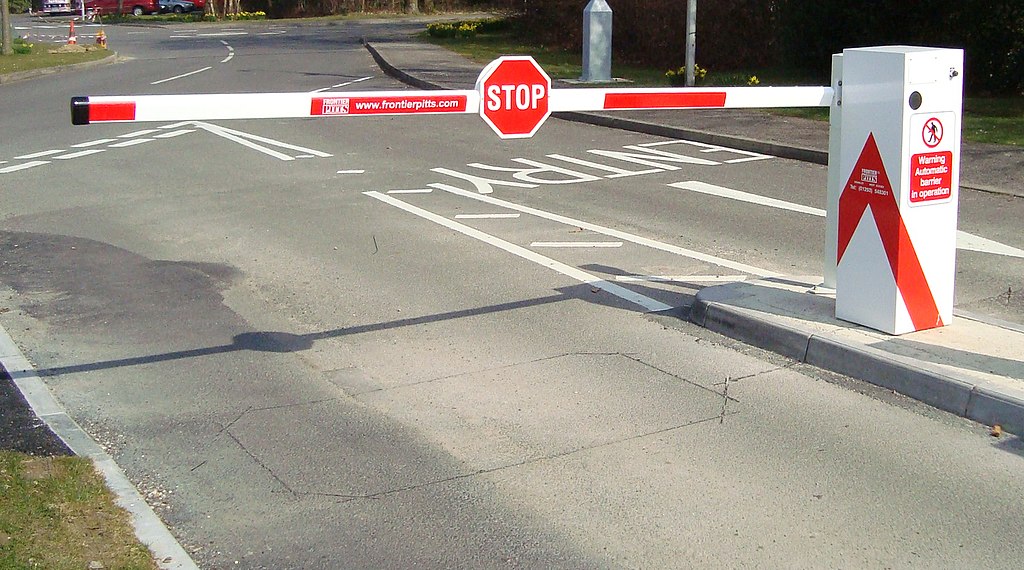 © Wikimedia.org/FrontierPitts, CC BY-SA
© Wikimedia.org/FrontierPitts, CC BY-SA
A crossing is a location on the road that is intended to cross and which is marked as such. They are for pedestrians and cyclists.
A crossroad or intersection is a place where two or more roads or streets meet or cross. Crossroads may be classified by number of road segments, traffic controls or lane design.
A yield or give way sign indicates that merging drivers must prepare to stop if necessary to let a driver on another approach proceed. A driver who stops or slows down to let another vehicle through has yielded the right of way to that vehicle.
By means of light signals, traffic lights control the crossing of an intersection, the access to bridges, tunnels and railway crossings, the access to parking garages and grounds, as well as the access regulation at factories, companies and other closed areas.
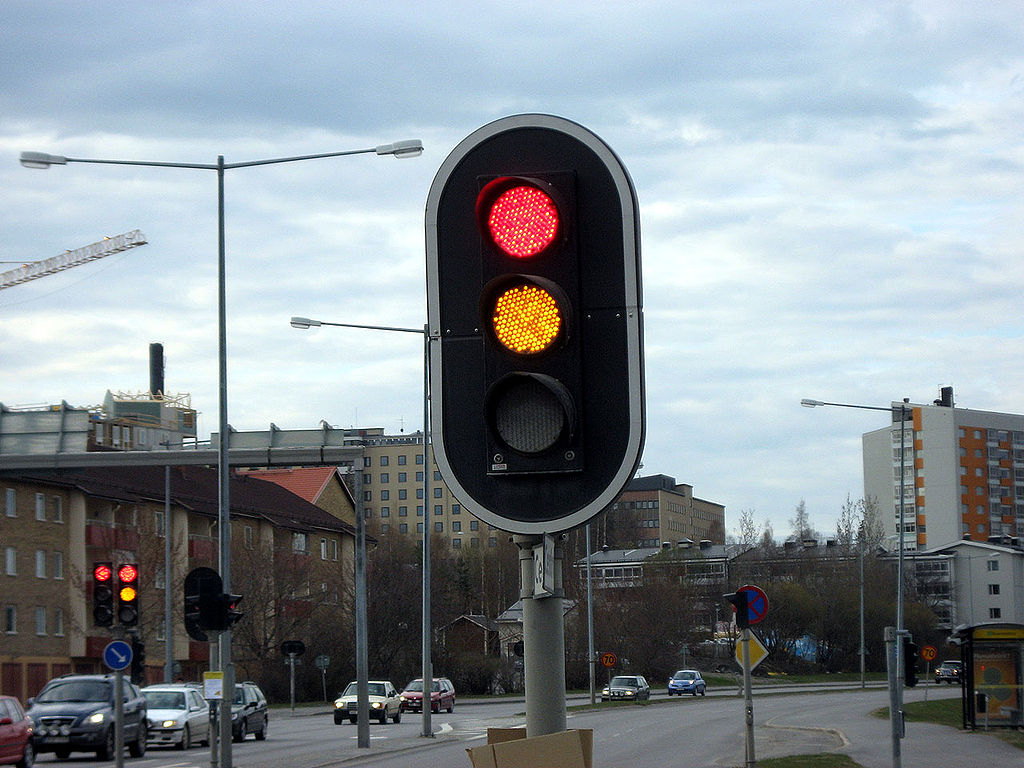 © Wikimedia.org/Petey21, CC0
© Wikimedia.org/Petey21, CC0
A disabled parking permitis displayed upon parking a vehicle permitting the operator of a vehicle to special privileges regarding the parking of that vehicle. These privileges include parking in a space reserved for persons with disabilities, or in some situations, permission to park in a time-limited space for a longer time, or to park at a meter without payment.
Driving is a very complex skill, because you often have to perform with different actions at the same time. Here you will find the basis for safe driving.
 © Wikimedia.org/BP63Vincent, CC BY-SA
© Wikimedia.org/BP63Vincent, CC BY-SA
A guardrail or crash barrier is a barrier placed next to roads to prevent vehicles from leaving the road in a lateral direction, tilting or traversing the central reservation. This reduces injury to occupants and damage to the car as much as possible.
The vehicles of the residents and their visitors, the vehicles for delivery included.
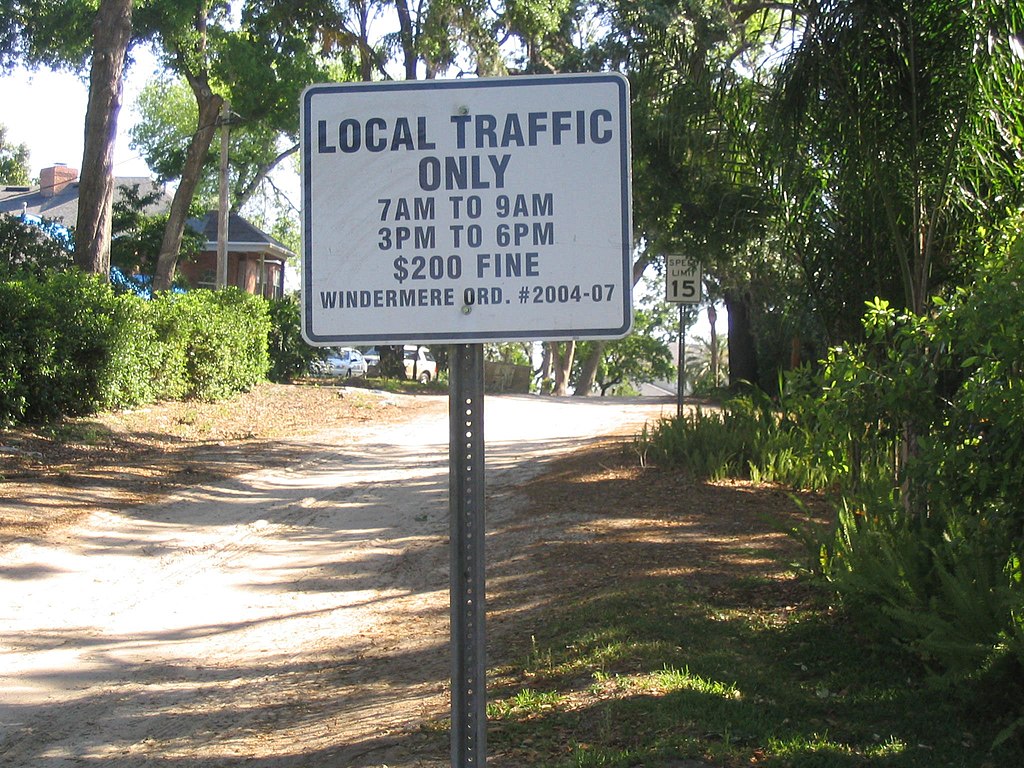 © Wikimedia.org/SPUI, CC0
© Wikimedia.org/SPUI, CC0
A low-emission zone is a selective admission policy for motor vehicles is used in relation to the environmental nuisance caused by these vehicles because of the quality of life, in particular the environmental and health problems caused by poor air quality.
A manual transmission, also known as a manual gearbox, a standard transmission, stick shift, or simply stick, clutch, or gearbox, is a type of transmission used in motor vehicle applications. It uses a driver-operated clutch, usually engaged and disengaged by a foot pedal or hand lever, for regulating torque transfer from the engine to the transmission; and a gear selector that can be operated by hands.
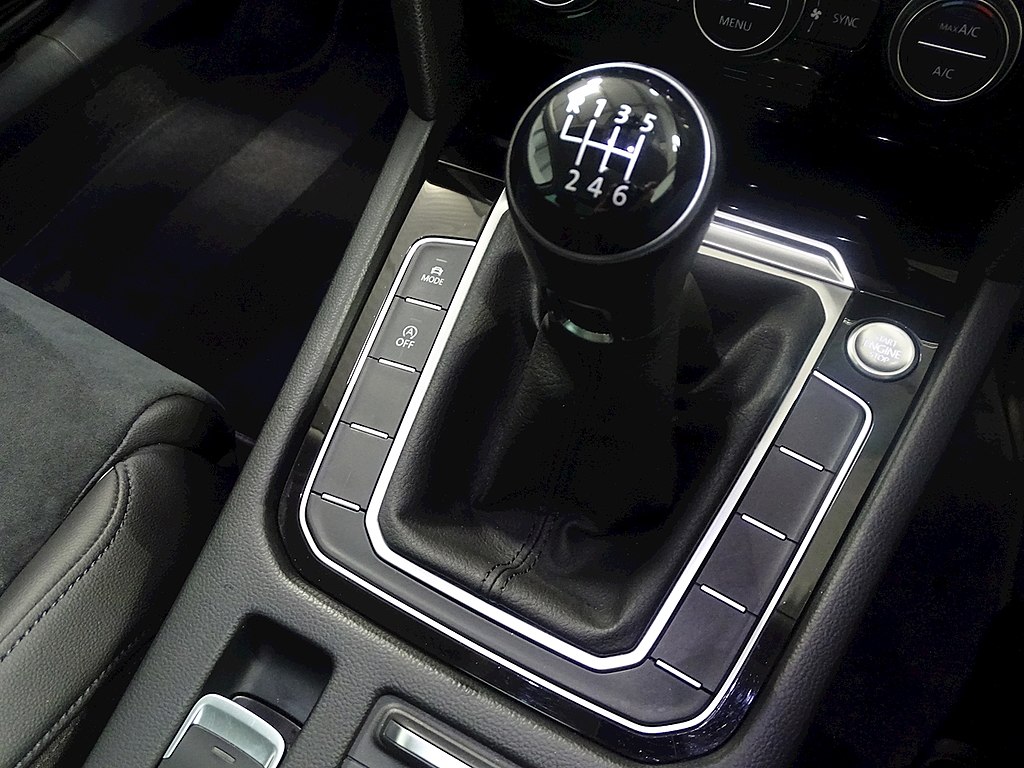 © Wikimedia.org/21C117, CC BY-SA
© Wikimedia.org/21C117, CC BY-SA
High-speed roads generally have a ramp/slip-in lane to give you time to build up speed. Use the ramp to achieve the same speed as the vehicles on the main road. If you have to wait for space on the main road, drive slower so that you have enough space to merge onto the main road.
Overtaking or passing is the act of one vehicle going past another slower moving vehicle, travelling in the same direction, on a road. When a vehicle is driving slower than the maximum speed, you can overtake the vehicle on the left. Overtaking is a very dangerous maneuver. Only overtake if there is enough space and if the road is completely free. When overtaking a pedestrian, cyclist or moped, there must be at least 1 meter distance. Overtaking is prohibited at crossroads, slopes, dangerous curves and crossings.
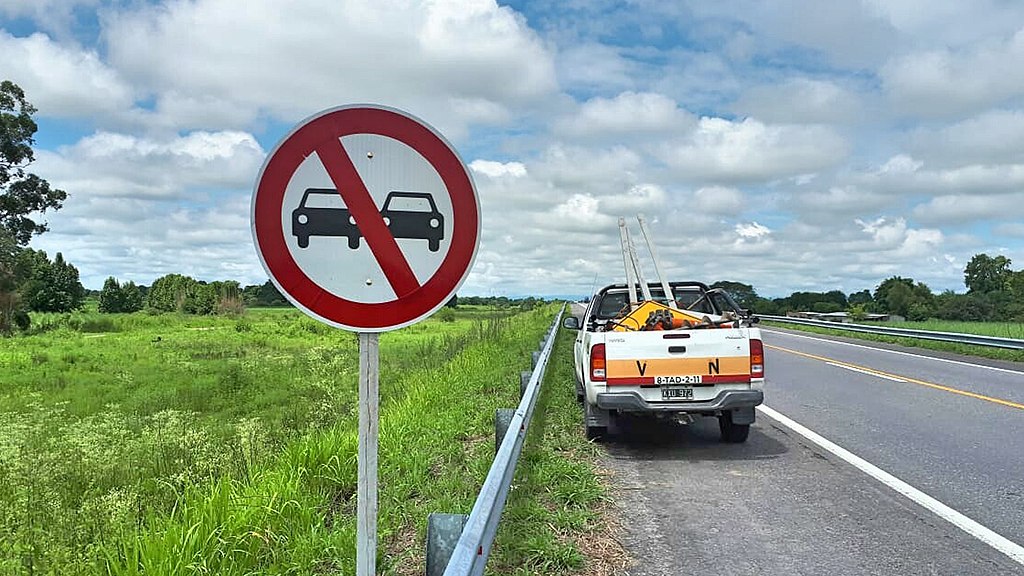 © Wikimedia.org/Argentina.gob.ar, CC BY
© Wikimedia.org/Argentina.gob.ar, CC BY
Parallel parking is a method of parking a vehicle parallel to the road, in line with other parked vehicles. Parallel parking usually requires initially driving slightly past the parking space, parallel to the parked vehicle in front of that space, keeping a safe distance, then followed by reversing into that space. Subsequent position adjustment may require the use of forward and reverse gears.
Park and ride facilities are parking lots with public transport connections that allow commuters and other people heading to city centres to leave their vehicles and transfer to a bus, rail system or carpool for the remainder of the journey. The vehicle is left in the parking lot during the day and retrieved when the owner returns. Park and rides are generally located in the suburbs of metropolitan areas or on the outer edges of large cities.
Parking is the act of stopping and disengaging a vehicle and leaving it unoccupied. Parking on one or both sides of a road is often permitted, though sometimes with restrictions. Some buildings have parking facilities for use of the buildings' users. Countries and local governments have rules for design and use of parking spaces. Drivers are responsible for making sure that their vehicle is not a hazard when it is parked. Park your vehicle at a place where it is allowed and make sure it is clearly visible for other road users.
Disc parking is a system of allowing time-restricted free parking through display of a parking disc or clock disc showing the time at which the vehicle was parked. A patrolling parking attendant can inspect the disc to check whether payment is owed. The system is common in Europe. The original system had been introduced along with establishing a Blue Zone area. The blue zones in the city centers allow for free parking of about 2 hours by using a parking disc.
A pay and display machine is a type of ticket machine used for regulating parking in urban areas or in car parks. It relies on a customer purchasing a ticket from a machine and displaying the ticket on the dashboard, windscreen or passenger window of the vehicle. Details included on a printed ticket are generally the location and operator of the machine, expiry time, fee paid and time entered.
A municipal parking card specifically intended for persons who have their main residence or domicile in the municipality, zone or street indicated on the map.
Roadmarks are used on paved roadways to provide guidance and information to drivers and pedestrians. Uniformity of the markings is an important factor in minimizing confusion and uncertainty about their meaning, and efforts exist to standardize such markings across borders. However, countries and areas categorize and specify road surface markings in different ways.
A roundabout is a kind of circular intersection in which the traffic continuously drives in one direction around a central island. The drivers at the roundabout always have priority.
A school environment is a place near a school. Pay extra attention to children playing.
Steering is the collection of components, linkages, etc. which allows any vehicle to follow the desired course. The primary purpose of the steering system is to allow the driver to guide the vehicle. Both hands should be placed on opposite sides of the steering wheel (i.e., left hand between 8 and 10 o’clock and right hand between 2 and 4 o’clock). This position is comfortable and on high-speed roads it allows you to make turns without taking your hands from the wheel.
A stop sign is a traffic sign designed to notify drivers that they must come to a complete stop and make sure the intersection is safely clear of vehicles and pedestrians before continuing past the sign.
A device installed on the carriageway and intended to channel vehicles traffic. The traffic conductor consists of a road marking, either from an elevation on the carriageway or from both elements together.
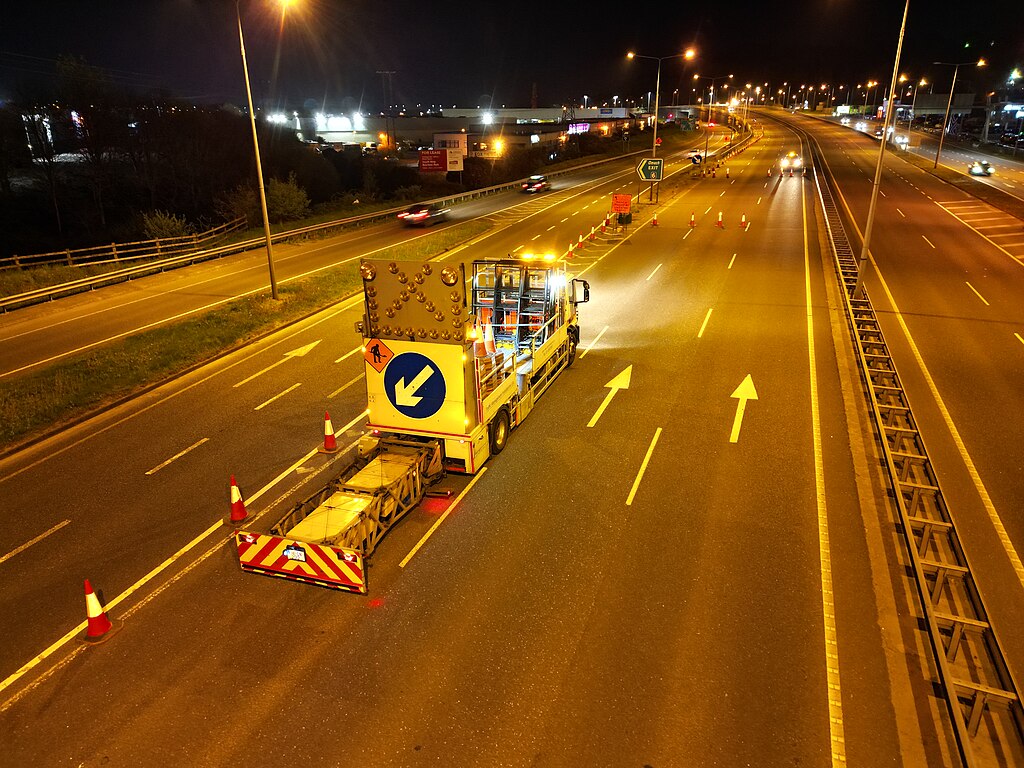 © Wikimedia.org/JamieTMI, CC BY-SA
© Wikimedia.org/JamieTMI, CC BY-SA
A railroad crossing is a crossing of a public road through one or more tracks built outside the carriageway.

Time for recess! Post a comment, ask a question or write a review. Feel free to let us know what you think!
I want to get the greek driving license, so should i study from here and thats it for the oral exam ? thanks a lot
Complete solutions and walkthroughs for all Brain Test game levels. Get step-by-step guides and video tutorials to solve every tricky puzzle.https://braintest.games/
According to Article 14 this diagram is incorrect. You stay in the inside lane unless you are coming off at the FIRST exit only.
Aerial Silks, Aerial Yoga Hammock all in over 46 colors. Of No-low and Low-medium Stretch Silks. Aerial Lyra, Hardware and more! Build your response time with Aerials www.aerialsusa.com
Speedlimit signs in Norway are not just at the start of the speedlimit. Every speedlimit sign exept 50 and 80 are also placed with a specific distance between eachother as a reminding. If there is no speedlimit sign for a while, you are either in a 50 or 80 area, depending on the road and amout of houses/buildings
Most of these DOES NOT exist on the official Greek test. //Someone that not only practiced it in Greece, but also scraped sites that had the official test (1:1 copy to the official one) in order to build a better learning site than existing ones (still a work in progress).
I think the wording is a bit unlucky. "Warning for cyclists" is wrong. It's a "Warning OF cyclists FOR everybody". I think all those "Warning for X" signs should be "Warning of X" or "Warning against X". And then it's not really as specific as some of them are described. E.g. there's one that says "Warning for deer", which should be "Warning against wildlife crossing". It's not deer, it could be warthogs or boars or foxes as well.
Traffic signs in Portugal follow European standards, using clear symbols and colors. They regulate speed, directions, and warnings https://bomcondutor.com.pt/ . Understanding them is essential for safe driving and avoiding fines or accidents.
This is a solid breakdown. But honestly, road safety starts with knowing the basics. Check this out for some cool tech related to it—might be worth a look: https://www.ainanobanana.pro
Driving tips are crucial, but people often forget the fun side of road trips. A good way to unwind is to play games while waiting in traffic, like maybe this cute puzzle game. <a href="https://chiikawapuzzle.art"; target="_blank">chiikawa puzzle</a>
Super useful for reviewing the driving code in Japan! I hope it will help me remember all the signs. Good luck to everyone taking the exam and play the https://sprunkiretake.io
This looks useful for studying! I hope it helps me not panic on the day of the exam. Fingers crossed for https://buzzcut.style!
Lot of info here, but I gotta say, knowing the right tire pressure is a game changer. Keeps your ride smooth and safe—check out this tool for some handy pixel art that might spark your creative side too. https://www.wplace.pro
To sum-up: A-3 and A-4 are wrong - the sign only tells you the direction of the first curve, the second one can be whatever A-6d and A-6e are not about sharpness, but about the incoming roads being one-way towards the road you're currently on A-18a is not about cattle specifically, but about farm animals or domesticated animals A-18b is not limited to deer, but any wild animals that might suddenly appear on the road, like elk or boars B-32a is literally "border control", but may also have different variations with different text meaning in general "stop here until you're explicitly allowed to go" All that info can be found on wikipedia.
A-4 also wrong. It means "dangerous curves — first to the left", the second one can be either left or right. It doesn't specify.
Wrong. This is A-6d, which "entry of the one-way road from the right". Nothing about sharpness. See: https://en.wikipedia.org/wiki/Road_signs_in_Poland
The questions are pretty good, but unfortunately there's no variety at all. Would be nice if there were questions about things other than the signs, which are arguably one of the easiest parts of traffic rules
If you don’t wear a seatbelt, you’re just asking for trouble. Plus, knowing how to handle slippery roads is crucial, or you’ll end up in a ditch. For those who enjoy homegrown food, check this out for some cool garden-to-table ideas. https://www.growagardenrecipes.pro
Look, safety on the road is no joke. All that talk about seatbelts and tire pressure? Spot on. But hey, if you're into photography too, check out this neat tool for some cool filters. Could make your car pics pop a bit more, ya know? https://www.digitalcamerafilter.art
A lot of good info here, but let's be real—nobody thinks about tire pressure until it's too late. By the way, if you're looking for something to get those creative juices flowing, check out this :https://www.my-doodle.art
<a href="https://www.memecoldplay.com"; rel="noopener noreferrer nofollow">memecoldplay</a>
Look, all this stuff is basic driving knowledge. But seriously, if you're gonna drive, at least know when to ditch the old-school habits. Check out this game to blow off some steam after a long drive, it’s got some epic battles <a href="https://www.animefinalstrike.org"; target="_blank">animefinalstrike</a>.
The polish sign "Curve of the main road" is actually a complimentary sign showing the "actual course of priority road" and there are several thousand variations of it as this is often "crossroad specific"
This goat is so beautiful! Living in the wild makes it look a bit thin. You can check out my website about whatsmyname的.https://whatsmynameapp.net/
More community